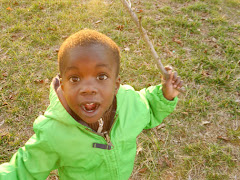They line them up, beds, machines and little faces toward the nurses' station: the gunshot wound, the baby heart, the car accident, the skull fracture. The names and stories change, the theme does not.
We are not alone.
Within a few feet of me are a half dozen lives stopped short by the unexpected, the unacceptable. And connected to those lives are all the families and friends, living life as usual until the phone call, the heart-stopping trip to the hospital, the words "this is more serious than we thought."
This blog is not meant to be a soliloquy on our experience as if it were somehow extraordinary or unique. If nothing else, the past two-and-a-half weeks have reminded me how amazingly ordinary we are. The most heart-wrenching stories involve children, of course. They're not supposed to suffer. They're not supposed to die. But all of us will face it, sickness, death—in our families and, inevitably, in ourselves.
Some of us are successful at postponing or denying the inevitable. But two weeks in the pediatric ICU rips off all the blinders . See parents return here to honor anniversaries, to take comfort in the conversation of nurses who cared for their children in the final days. Hear stories of weeks spent comatose from car accidents, of repeated hospital stays and lives shortened by birth defects, of tiny babies who have never known the quiet of their nursery cribs. This is not how it is supposed to be.
So, in the face of this inevitability, what is there besides repression, denial or complete despair?
I admit, I come to this question with biases of my own. I believe in God. My faith has shaped me. Without it, my family, my life, my plans for the future—nothing looks the same. Given this disclaimer, my faith had never truly met this test. To be told your child will die. To look ahead and not to know. To look back at everything you thought was providence and promise and to wonder, is it all for nothing? Is this what he has come for?
These are inevitable questions, no matter what the age—whether we face death ourselves or in those we love. In such moments, perhaps really only then, do we realize our futility. We are grass. We are dust.
So, in this time, what does faith supply?
All I know is my experience. And what I know is that I have not so much clung to it as it has clung to me. The less I have to muster, the more it has to offer. The strength at hand seems bolstered by my frailty. The darkest night has brought the greatest peace. Faith, the substance of things hoped for, the evidence of things not seen, emerges from the promise as diamond-hard, rock-solid truth. I may be dust, but faith's cable fixes me to a reality far greater than myself. Like Job, I know that, "I had heard of you by the hearing of the ear, but now my eye sees you; therefore I despise myself, and repent in dust and ashes.”
I am still emotionally tender. I get frustrated at our circumstances and feel twinges of anxiety at the uncertainty of Levi's future. But the truth delivered offers context. It is grounded in the promise that this life is not forever. Beyond death, beyond sorrow exist eternity and joy. Peace offered is not simple condescension, shallow comfort from the distant gods. It is knowledge that suffering, as we chose it long ago, does not have to end in emptiness. His suffering, in fact, delivers joy and the expectation of a reality that will one day reduce these past weeks, this life, to a needle prick of memory.
So, somehow within grace, there is room for sorrow and for joy. Sorrow in the life we have been given, joy for the glory that is promised. For me, it has never been so real.
Wednesday, February 27, 2008
Subscribe to:
Post Comments (Atom)


No comments:
Post a Comment